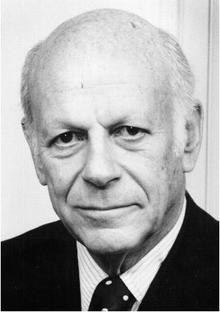William Schuman facts for kids
William Howard Schuman (born August 4, 1910 – died February 15, 1992) was an American composer. He also helped manage and lead arts organizations.
Contents
William Schuman's Early Life and Music Journey
William Schuman was born in Manhattan, New York City. His family was Jewish. He was named after the 27th U.S. president, William Howard Taft, but his family called him Bill.
As a child, Schuman played the violin and banjo. However, his biggest love was baseball! While still in high school, he started a dance band called "Billy Schuman and his Alamo Society Orchestra." They played at local weddings and parties. Schuman played the string bass in the band.
In 1928, he started studying business at New York University. At the same time, he worked for an advertising company. He also wrote popular songs with a friend, E. B. Marks Jr. Around this time, Schuman met a songwriter named Frank Loesser. They wrote about forty songs together.
A Life-Changing Concert
On April 13, 1930, something amazing happened. Schuman went to a concert at Carnegie Hall. The famous conductor Arturo Toscanini led the New York Philharmonic orchestra.
Schuman later said about this experience, "I was amazed by all the string instruments. Everyone was bowing together. Just seeing it was incredible! But the sound! I was completely overwhelmed. I had never heard anything like it." He added, "The very next day, I decided to become a composer."
After that, Schuman left school and his job to study music. He learned from different teachers, including Roy Harris. Harris helped Schuman get noticed by the conductor Serge Koussevitzky. Koussevitzky became a big supporter of Schuman's music. He even conducted Schuman's Symphony No. 2 in 1939.
Schuman's Symphony for Strings is one of his most famous works. It was written to honor Natalie Koussevitzky. Koussevitzky himself conducted its first performance in 1943.
Awards and Leadership
In 1943, Schuman won the first-ever Pulitzer Prize for Music. He won it for his piece Cantata No. 2. A Free Song. This piece used poems by Walt Whitman.
From 1935 to 1945, he taught music at Sarah Lawrence College. In 1945, he became the president of the Juilliard School. This is a very famous music school. While there, he started the Juilliard String Quartet.
In 1961, he became the president of Lincoln Center. This is a huge performing arts center in New York City. He held this important job until 1969.
Schuman received many other honors. In 1985, he won a special Pulitzer Prize. It recognized his "more than half a century of contribution to American music as composer and educational leader." In 1987, he received the National Medal of Arts.
William Schuman passed away in New York City at age 81. He left behind his wife, Frances, two children, and one grandchild.
William Schuman's Music
William Schuman wrote a lot of music. He composed ten symphonies, though he later removed his first two. His symphonies are still very important in classical music.
His concerto for violin (written in 1947) is considered one of his most powerful pieces. A concerto is a piece for a solo instrument with an orchestra.
Other well-known works include:
- The New England Triptych (1956). This piece uses old American melodies by William Billings.
- The American Festival Overture (1939). An overture is a piece of music played at the beginning of an opera or ballet, or as a standalone concert piece.
- The ballets Undertow (1945) and Judith (1949). Ballets are stories told through dance and music. Judith was written for the famous dancer Martha Graham.
- Two operas: The Mighty Casey (1953) and A Question of Taste (1989). An opera is a play where most of the words are sung. The Mighty Casey was based on the famous baseball poem "Casey at the Bat". This showed his lifelong love for baseball.
Schuman also arranged Charles Ives's organ piece Variations on "America" for orchestra in 1963. This orchestral version is very popular today. Another famous piece is his George Washington Bridge (1950), written for a concert band.
William Schuman on Television
William Schuman even appeared on a TV game show! He was the first guest on the CBS show What's My Line? on September 30, 1962. The show's panel members were blindfolded because he was quite recognizable.
Schuman was identified as "Composer and President of Lincoln Center for the Performing Arts." He showed his quick wit when answering questions. When asked if he was Leonard Bernstein, Schuman replied, "I'm his friend." He gave the same answer when asked if he was Rudolf Bing.
Eventually, one of the panel members guessed who he was. The show's host announced that Schuman's Eighth Symphony would be performed soon. This performance, on October 4, 1962, was the first time the piece was ever played.
See also
 In Spanish: William Schuman para niños
In Spanish: William Schuman para niños
 | Lonnie Johnson |
 | Granville Woods |
 | Lewis Howard Latimer |
 | James West |


